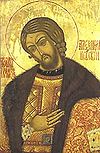- Mikhail Ivanovich Popov
-
Mikhail Ivanovich Popov (Russian: Михаи́л Ива́нович Попов) (1742, Yaroslavl – 1790) was a Russian writer, poet, dramatist and opera librettist of the 18th century.
Contents
Biography
Born into a merchant family, he was a pupil of Fyodor Volkov. After 1757 he was an actor at the Court Theatre in St Petersburg. He entered Moscow University in 1765, and began to translate comedies from German and French. He wrote a collection of lyrics called “Songs” (1765).
During 1771–1772 he translated the poem Gerusalemme Liberata (Jerusalem Delivered) by Torquato Tasso and wrote the novel Slavyanskie Drevnosti (Славянские древности – The Slavonic Antiquities). Together with Mikhail Chulkov, he published a collection of Russian folk songs. His own collection of songs, Russian Erota or the Collection of the Best and Newest Russian Songs (Российская Эрота, или Выбор наилучших новейших русских песен), was published posthumously in 1791. Popov wished to popularize Slavic mythology, which had been largely forgotten in Russia in his time, as a more patriotic alternative to Greek and Roman mythology. To this end, he conducted some rather inaccurate research and wrote the essay, Описание древнеславянского баснословия (The Description of Ancient Slavic Fable-writing, 1768). He included this essay in the collection of his poems, translations and plays called Dosugi (Досуги – Lesure Hours), published at the request of Empress Catherine II. This collection also contained his famous libretto to the opera Anyuta.
Opera librettist
He wrote a few librettos for comic operas and was especially celebrated for the text of the one-act opera Anyuta, which was given at the (Chinese Theatre, Tsarskoye Selo, September 6 [OS August 26] 1772). The music was a selection of popular songs specified in the libretto. The story is about a girl called Aniuta, brought up in a peasant household, who turns out to be of noble birth, and the story of her love for a nobleman, Victor, which eventually ends happily with wedding bells. The music hasn’t survived, and the composer is unknown, although it is sometimes attributed to Vasily Pashkevich or even to Yevstigney Fomin, who at that time was just 11 years old.
Bibliography
Polovtsev, A.A. Russian Biographical Dictionary (Русский биографический словарь А.А.Половцова) published 1896-1918, (see the link below)
External links
- Biography 1
- Biography 2
- Russian Comic Opera
- "Russian Biographical Dictionary" that contains the most accurate information
See also
People from Russia Leaders and religious - Pre-1168
- 1168–1917
- 1922–1991
- 1991–present
- RSFSR leaders
- General secretaries
- Soviet premiers (1st deputies)
- Soviet heads of state (and their spouses)
- Prime ministers (1st deputies)
- Foreign ministers
- Prosecutors general
- Metropolitans and patriarchs
- Saints

Military and explorers - Field marshals
- Soviet marshals
- Admirals
- Aviators
- Cosmonauts
Scientists and inventors - Aerospace engineers
- Astronomers and astrophysicists
- Biologists
- Chemists
- Earth scientists
- Electrical engineers
- IT developers
- Linguists and philologists
- Mathematicians
- Naval engineers
- Physicians and psychologists
- Physicists
- Weaponry makers
Artists and writers Sportspeople - Chess players
Categories:- 1742 births
- 1790 deaths
- People from Yaroslavl
- Russian writers
- Russian poets
- Russian opera librettists
- Russian dramatists and playwrights
Wikimedia Foundation. 2010.

